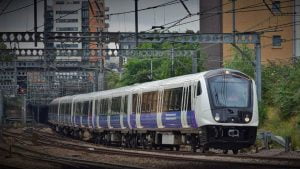The first electric Škoda 16Ev units of the Latvian national carrier Vienā vilcienā (VIVI) are now in passenger service in the country’s capital, Riga.
Minister of Transport Kaspars Briškens was present as the trains officially entered service at Riga Central Station on the Saturday 16 December at 10.58 local time.
Škoda Group will deliver the last of the trains in mid-2024.

Škoda is supplying thirty-two passenger-ready, 1520mm-gauge electric trains to Latvia. The trains are based on the RegioPanter in the Czech Republic, but adapted to conditions in Latvia. As well as the wide gauge, they are also wider and can carry more passengers in their four coaches. Each electric train is 109 metres long and has 436 seats.
Boarding the train from the platform is level, and the doors are wide, making passenger access easier, quicker and more accessible. The trains are fully air-conditioned, and have ergonomic seats, video and audio information systems, and Wi-Fi connectivity. They boast smoother and quieter operation than those currently in use.
The trains currently run at 120 km/h, but will be able to reach 160 km/h when infrastructure improvement allows it.
Now it has these new electric trains in service, VIVI will introduce interval timetables, with trains run every fifteen to twenty minutes during the weekday morning and evenings peak periods.
The new trains will operate from Riga to Aizkraukle, Tukums, Skulte and Jelgava. Riga has a population of around 620,000, and is located on the Baltic Sea at the mouth of the River Daugava.

Zdeněk Sváta, Member of the Board of Directors of Škoda Group, said, “We are pleased that after the hard work of all our colleagues we have managed to cope with the impact of the Covid-19 pandemic and the Russian aggression in Ukraine. Thanks to the efforts of our entire extended team, we stand here today with the first units ready to carry passengers. At this point, I would like to express my sincere thanks to all colleagues involved in the implementation of this contract. It would not have been possible without you. I would also like to thank the customer, with whom there is great cooperation, and also the representatives of Latvia. I believe that from now on, all passengers will enjoy travelling with the new units with pleasure.”
Chair of the Board of JSC ‘Pasažieru vilciens’ Rodgers Jānis Grigulis said, “At this time when we thank a number of partners who have supported us on the way to these trains, in their testing, certification and training of employees, I would like to say special thanks to every employee of joint stock company ‘Pasažieru vilciens’ – both those who were directly involved in the delivery process of electric trains and those who through their daily work have ensured that the train service is already highly appreciated by passengers today. Together, we are taking a big step forward in the development of train travel and we continue to work to ensure that more and more passengers choose to travel by train, ensuring regional accessibility, helping the country to meet its mobility goals and passengers to have a more pleasant experience.”






Responses